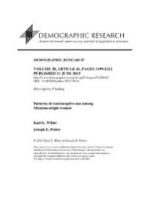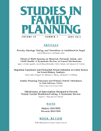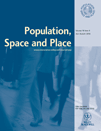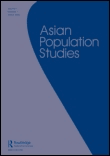
Demographic Research
Scope & Guideline
Innovating research for a deeper demographic understanding.
Introduction
Aims and Scopes
- Population Dynamics and Trends:
The journal focuses on shifts in population dynamics, including fertility rates, mortality rates, and migration patterns, analyzing their implications for social structures and policies. - Health and Mortality Studies:
A significant area of research involves examining health disparities and mortality rates across different populations, utilizing advanced statistical models and demographic techniques. - Socioeconomic Factors and Family Structures:
Research often investigates the impact of socioeconomic factors on family structures, including marriage, divorce, and child-rearing practices, highlighting variations across regions and cultures. - Methodological Innovations in Demography:
The journal promotes innovative methodologies for demographic analysis, including Bayesian approaches, sequence analysis, and the use of big data for population studies. - Interdisciplinary Approaches to Demography:
Demographic Research encourages interdisciplinary perspectives, integrating insights from sociology, economics, public health, and environmental studies to enrich demographic analysis.
Trending and Emerging
- Impact of COVID-19 on Demographics:
A significant increase in research examining the demographic impacts of the COVID-19 pandemic, including effects on fertility, mortality, and family dynamics, highlights the pandemic's lasting influence on population studies. - Climate Change and Migration:
Emerging research focuses on the intersection of climate change and migration patterns, analyzing how environmental factors influence population movement and demographic changes. - Gender Inequality and Family Dynamics:
There is growing attention to gender roles within families, particularly regarding the division of labor and parenting responsibilities, as researchers explore the implications of these dynamics for demographic trends. - Mental Health and Demographic Factors:
An emerging theme is the relationship between demographic factors (such as marital status and parental roles) and mental health outcomes, reflecting a broader interest in well-being within demographic research. - Technological Advances in Data Collection:
The use of new technologies and data sources, including social media and mobile data, is on the rise, enabling more nuanced analyses of demographic trends and behaviors.
Declining or Waning
- Traditional Fertility Studies:
Research specifically focused on traditional fertility patterns has waned, with a shift towards examining fertility in the context of broader socioeconomic factors and changing family dynamics. - Historical Demography:
Studies centered on historical demographic trends, while still valuable, have decreased in frequency as contemporary issues such as migration and health disparities gain prominence. - Static Migration Models:
The use of static migration models has declined, giving way to more dynamic, multidimensional approaches that account for the complexities of migration in a globalized context. - Single-Factor Analysis of Demographic Issues:
There is a decreasing trend in studies that analyze demographic issues in isolation; instead, research is increasingly integrated, considering multiple interacting factors.
Similar Journals

European Journal of Population-Revue Europeenne de Demographie
Advancing Demographic Insights for a Changing WorldWelcome to the European Journal of Population-Revue Europeenne de Demographie, a premier scholarly publication dedicated to advancing the field of demography. Published by Springer since 1985, this journal has established itself as a vital resource for researchers, professionals, and students interested in population studies, evidenced by its Q1 ranking in Demography for 2023 and a notable Scopus ranking within the top 20% of its category. With an ISSN of 0168-6577 and an E-ISSN of 1572-9885, the journal provides a platform for high-quality, peer-reviewed research, contributing to the understanding of population dynamics and demographic trends across Europe and beyond. Although currently not open access, the journal ensures broad mobility of knowledge through diverse access options, aspiring to bridge theoretical insights and practical applications crucial for policy-making and societal engagement. Join us in exploring the intricate tapestry of demographic data as we examine pressing issues such as migration, fertility, mortality, and population aging in an ever-evolving global context.

Regional Statistics
Empowering Research with Regional StatisticsRegional Statistics, published by the Hungarian Central Statistical Office, is a leading scholarly journal that plays a pivotal role in enhancing the understanding of regional development and statistical analysis. With its ISSN 2063-9538 and E-ISSN 2064-8243, this open-access journal contributes significantly to various fields, including Cultural Studies, Economics, Geography, and Public Administration. The journal has established itself with impressive Scopus rankings, placing it in the top percentiles across multiple categories, evidencing its high-quality research outputs. Covering converged years from 2015 to 2024, Regional Statistics publishes insightful articles that address pressing regional issues, making it an invaluable resource for researchers, professionals, and students alike who are interested in the quantitative dimensions of society. With a reputation bolstered by its Q1 and Q2 categorizations in various disciplines, this journal is not only committed to advancing statistical knowledge but also to fostering interdisciplinary dialogue among statisticians, policymakers, and social scientists.

POPULATION
Unpacking the Complexities of Population StudiesPopulation, an esteemed journal published by the Institut National d'Études Démographiques (INED), serves as a critical platform for the dissemination of high-quality research in the field of demography. With the ISSN 0032-4663 (Print) and E-ISSN 1957-7966 (Online), this journal covers a wide spectrum of topics related to population studies, including migration, fertility, mortality, and population policy, offering a comprehensive lens on demographic trends that influence societies worldwide. Although it operates under a traditional subscription model, its rigorous peer-review process ensures that only the most impactful and relevant research findings are published. With its long-standing reputation among scholars and practitioners in the demographic domain, Population plays a vital role in shaping the academic discourse and guiding future research directions. Scholars, professionals, and students alike will find in its pages not only innovative perspectives but also critical insights that reflect the complexities of population dynamics in a rapidly changing world. For those dedicated to understanding the demographic challenges that societies face today, this journal remains an invaluable resource.

STUDIES IN FAMILY PLANNING
Empowering research for a sustainable future in demography.STUDIES IN FAMILY PLANNING, published by WILEY, is a renowned journal that serves as a critical resource in the fields of Demography and Social Sciences. With an impressive Q1 ranking in both categories, it is recognized for its high impact and influential contributions to the understanding of family planning dynamics, reproductive health, and population studies. The journal has published scholarly articles since 1970, reflecting its long-standing commitment to advancing knowledge and research in these important areas. Currently holding a rank of #27 out of 139 in Demography on Scopus, the journal's 2023 impact factor underscores its influential role in shaping policy and practice worldwide. Though it operates under a subscription model, it is readily accessible to members of the academic community, including researchers, professionals, and students dedicated to improving family planning systems and socio-demographic studies.

Population Space and Place
Illuminating Spatial Dimensions of Demographic ChangePopulation Space and Place is an esteemed academic journal published by WILEY, dedicated to advancing the fields of demography and geography, planning, and development. With an impressive 2023 impact factor and categorized in the top quartile (Q1) for both demography and geography, this journal serves as a vital platform for researchers, professionals, and students seeking to explore the spatial dimensions of population dynamics. Founded in 2004 and running through 2024, it has established itself as a significant contributor to scholarly discussions, evidenced by its high Scopus rankings, including rank #18 out of 139 in demography and #165 out of 821 in geography and planning. While the journal currently does not offer open access, it remains a key resource for those involved in academic research and policy formulation. With its focus on the interplay between population trends and spatial analytics, Population Space and Place is essential for anyone aiming to understand the complexities of population geography in a rapidly changing world.

Comparative Population Studies
Fostering dialogue through comparative demographic research.Comparative Population Studies is an esteemed open-access journal published by the BUNDESINSTITUT BEVOELKERUNGSFORSCHUNG in Germany, dedicated to advancing the field of demography. Since its launch and transition to open access in 2010, the journal has provided a platform for researchers to share innovative population studies, promoting a deeper understanding of demographic trends and patterns globally. With an impressive Q2 rank in Demography within the 2023 quartile categories and a commendable rank #61 out of 139 in Scopus' Social Sciences Demography classification, it plays a vital role in disseminating rigorous research. The journal covers a range of topics related to population dynamics, migration, and social implications, making it invaluable to academics, professionals, and students in the field. With an emphasis on comparative studies, Comparative Population Studies not only fosters scholarly dialogue but also enhances policy-making and economic planning. Located at Friedrich-Ebert-Allee 4, Wiesbaden 65185, Germany, the journal continues to be a prominent resource for those eager to engage with the latest demographic research.

POPULATION RESEARCH AND POLICY REVIEW
Fostering Dialogue Between Demographic Research and Policy MakingPopulation Research and Policy Review is a prestigious journal published by Springer, specializing in the fields of demography and policy analysis. Established in 1982, this journal has developed a significant reputation within the academic community, currently holding a Q1 ranking in Demography and a Q2 ranking in Management, Monitoring, Policy, and Law as of 2023. With a robust Scopus ranking of #34 out of 139 in Demography and a readership that spans multiple disciplines, this journal serves as a critical platform for researchers, professionals, and policymakers to disseminate their findings and insights related to population dynamics and policy implications. Although not an open-access journal, Population Research and Policy Review provides vital research that influences both theoretical frameworks and practical applications in social sciences and environmental management. The journal’s ongoing commitment to high-quality, peer-reviewed scholarship makes it an indispensable resource for those seeking to understand and address contemporary demographic challenges.

International Journal of Population Data Science (IJPDS)
Unlocking the potential of data for societal advancement.Welcome to the International Journal of Population Data Science (IJPDS), an esteemed publication dedicated to advancing the field of population data science through innovative research and comprehensive studies. Published by Swansea University in the United Kingdom, this open access journal has been providing a platform for scholarly exchange since 2017, making it freely accessible to a global audience. With an impressive Q1 ranking in Demography and notable placements in Health Informatics and Information Systems, IJPDS attracts high-quality contributions that enhance our understanding of population dynamics and inform health data management. Here, researchers, professionals, and students can explore cutting-edge findings that bridge data science and health applications, underscoring the significance of data-driven insights for societal advancement. The journal’s broad scope ensures it remains at the forefront of demographic and informatics research, essential for tackling contemporary challenges in health and population studies.

Asian Population Studies
Advancing Knowledge on Asian Population DynamicsAsian Population Studies is a distinguished journal published by Routledge Journals, Taylor & Francis Ltd, delivering comprehensive insights into the vibrant field of demography. Since its inception in 2006, this peer-reviewed journal has consistently provided a platform for high-quality research that enhances our understanding of population dynamics in Asia. With an impressive category ranking of Q2 in Demography for 2023, and holding a notable position as 35th out of 139 within the Scopus ranking, it is recognized for its significant contributions to the field, appealing to researchers, scholars, and professionals alike. The journal covers a diverse range of topics, including population growth, migration patterns, and socio-economic factors influencing demographic changes across Asian countries. Although it does not offer open access, Asian Population Studies remains a vital resource for those seeking to explore demographic trends and their implications for policy and practice in one of the most populous regions of the world. With a commitment to academic excellence, it continues to serve as an essential tool for anyone engaged in demographic research and study.

Espaces-Populations-Societes
Advancing Knowledge in Population and GeographyEspaces-Populations-Sociétés is a distinguished journal published by UNIV LILLE I SCI & TECH, focusing on the fields of demography and geography. Established in 1983, this open-access journal has committed itself to providing a platform for innovative research and discussions around population dynamics and spatial organization, with accessibility to its content available since 2004. Based in France, at the UFR Géographie & Aménagement, the journal plays a crucial role in advancing understanding of demographic trends and planning developments. With current Scopus rankings highlighting its position in the 25th and 14th percentiles for Demography and Geography, Planning and Development respectively, it maintains a reputable standing within academic circles, establishing its importance in contemporary research landscapes. Researchers, professionals, and students alike will find valuable insights in its comprehensive overview of sociocultural and environmental interactions, as well as place-based issues at the heart of societal development.